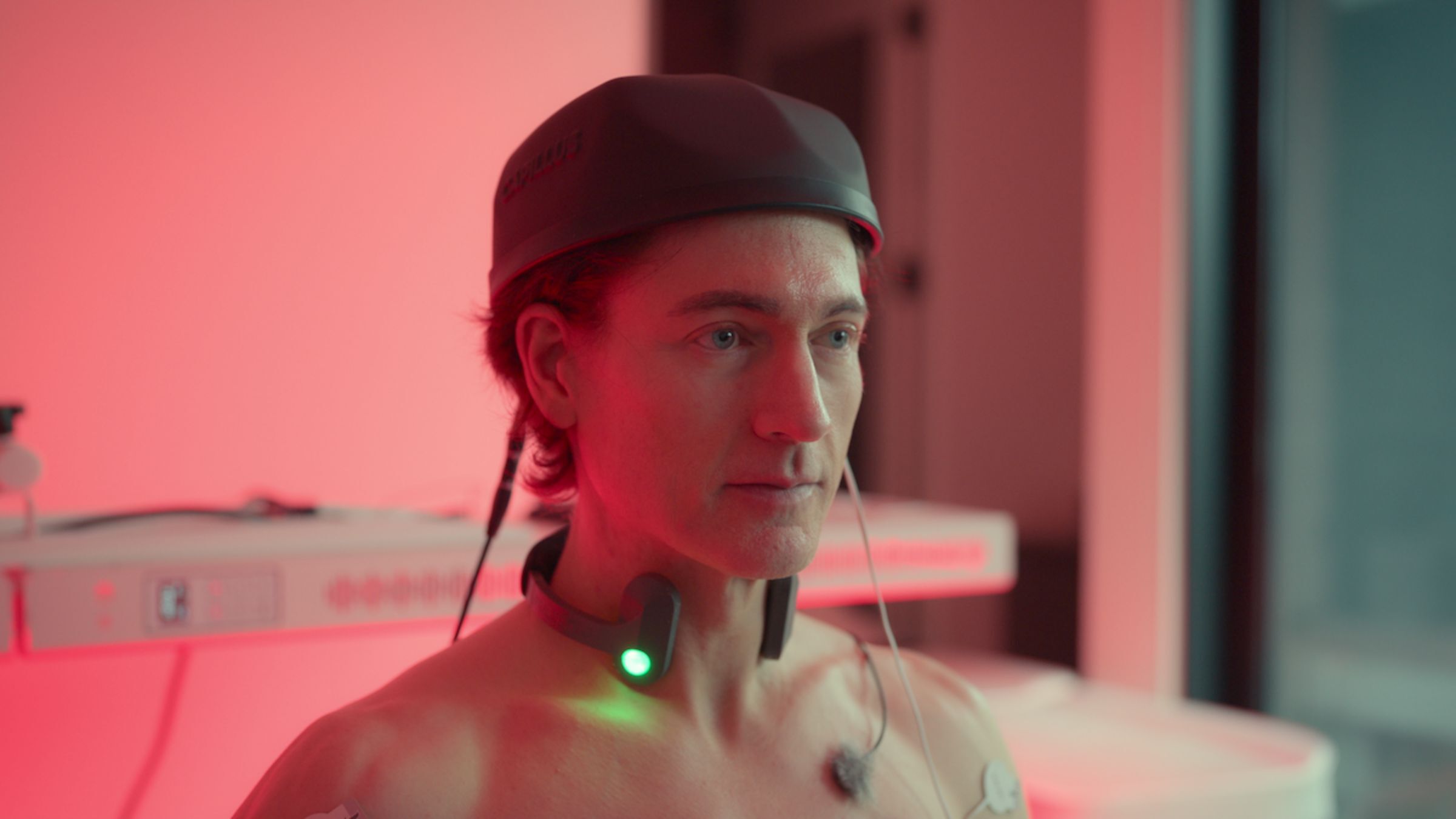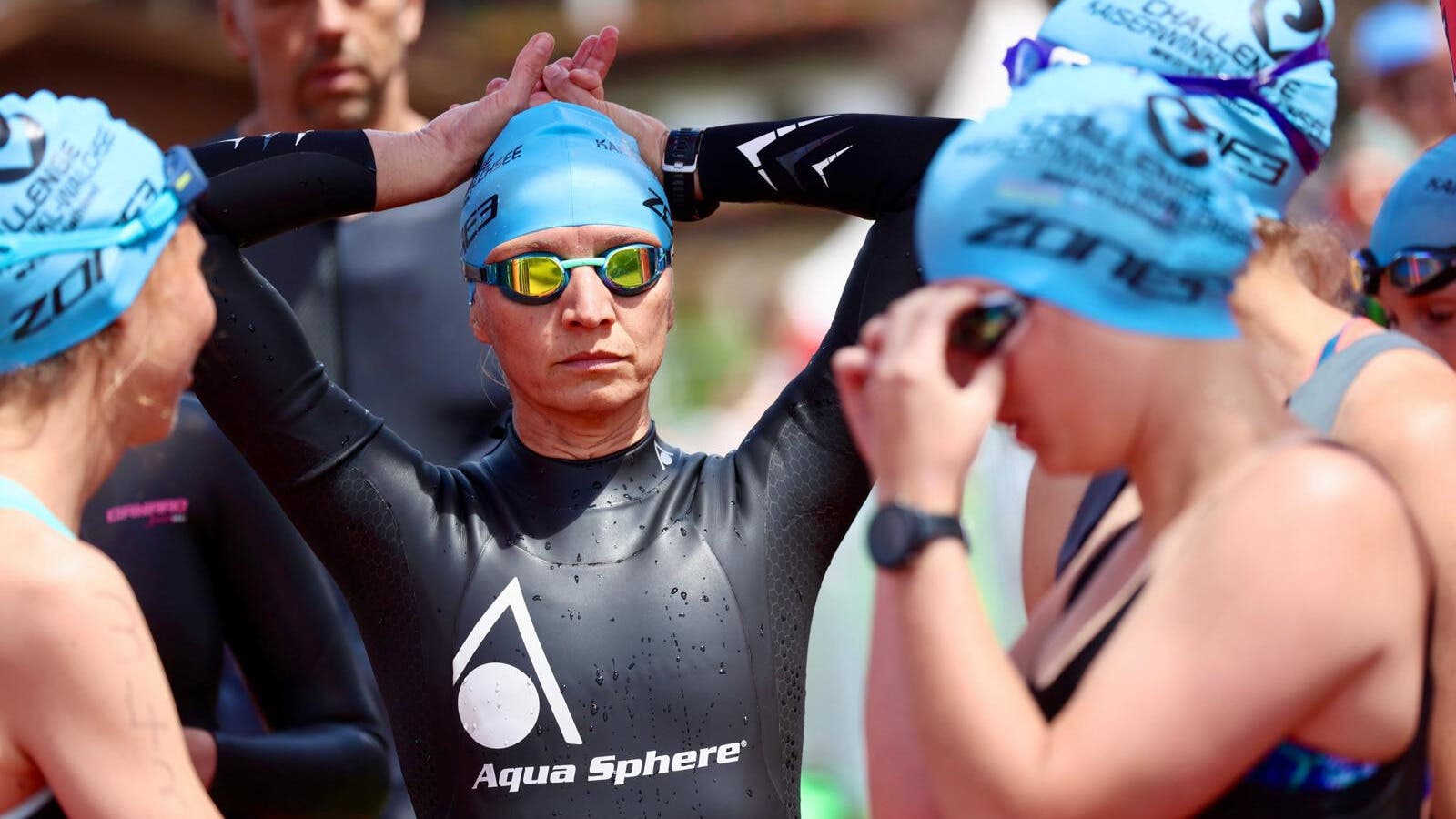Can Triathlon Training Turn Back the Clock on Your Biological Age?

Thanks to a hit new Netflix film, many people are asking: What is my biological age? Triathletes might have an advantage in the anti-aging movement. (Photo: Netflix)
The Netflix documentary “Don’t Die: The Man Who Wants to Live Forever” follows the story of Bryan Johnson, a 47-year-old man who has devoted his time, energy, and sizable wealth to the pursuit of anti-aging. To date, Johnson claims to have achieved “perfect biomarkers” and reversed his biological age by five years. Make no mistake – this is no whimsical Peter Pan story, but a pseudoscientific quest to turn back one’s biological clock through a rigorous fasting routine, supplements, experimental treatments, and exercise.
But how much exercise does it take to reverse your biological age? Surprisingly little, according to Johnson. In the documentary, Johnson references a daily 45-60 minute routine of 25 exercises plus brief HIIT, which he describes in more detail on his YouTube channel. Throw in an occasional hike or two, and the exercise box is checked for anti-aging (you will, of course, need to spend many more hours and dollars to check the other boxes in Johnson’s “Don’t Die Protocol”).
For endurance athletes in the thick of training, six hours of exercise per week might feel a little light, and triathletes are notoriously aversive to strength training, preferring to spend their time in steady Zone 2 efforts. But many get into endurance sports to get healthy, live longer, and feel younger. It begs the question: If a little exercise is good for anti-aging, is a lot better? We asked Laura Kunces, vice president of medical strategy at Thorne to break down what endurance athletes need to know about how training affects biological age.
What is biological age?
The time that has elapsed since the day you were born is your chronological age – in other words, the age that aligns with what’s on your birth certificate or driver’s license. From a health and medical standpoint, chronological age is helpful in understanding whether a symptom or issue is typical or atypical for the person experiencing it. Changes to vision in a 20-year-old might be alarming; in a 50-year-old, it might simply signal a common age-related condition known as presbyopia.
Biological age is different, says Kunces: “Your biological age is how your cells are looking from an age standpoint. As we age chronologically, oftentimes we also age biologically.”
But this doesn’t always happen at the same rate. Your cells may look or act younger or older than your chronological age in response to diet or lifestyle. This might also be visible without a blood sample or microscope – if you’ve ever met an 80-year-old triathlete who moves with the energy and alertness of a 50-year-old, that’s biological aging in action.
But if you want to quantify your biological age, multiple tests are available – usually through blood analysis like Function Health or Thorne – to give you a number that shows what your biological age is relative to chronological age.
What is my biological age? Measurement methods explained
“Biological age is a buzzy term out there, and different people have different tests and different ways to look at it,” Kunces says. There is no one widely-accepted measurement tool for biological age, perhaps because the science is new, having been first introduced in a scientific paper in 2013.
There is no gold standard for measuring biological age, and the tests that do exist are best-guess models. Some ways tests measure biological age include:
- Telomere length, or DNA structures at the end of chromosomes that shorten as a person ages; longer telomere length may indicate a longer lifespan, according to some studies.
- A variety of biomarkers to calculate biological age. Researchers have identified 16 biomarkers that could be used in calculating biological age,
- Others have come up with their own way of testing. Thorne, for example, uses what Kunces calls “an extremely large database of blood biomarkers from individuals of all ages, all lifestyles, all backgrounds, all ethnicities” and a “complex algorithm to help understand how you compare to other people from a clinical biomarker standpoint.”
- Artificial intelligence is also identifying new ways to measure biological age in health tests like EKGs or hormone metabolism pathways in the blood.
What factors affect biological age?
Though there’s no way to avoid aging altogether, there are some consistent factors that contribute to the speed at which we age:
- Diet: Research suggests a person’s diet might be the biggest factor in determining how fast (or slow) a person ages. Though no one specific proven “biological aging diet” exists, experts mostly agree it’s a good idea to get a variety of fruits and vegetables, whole grains, healthy fats, and lean proteins.
- Sleep: The quantity and quality of sleep have been found to affect biological age, as the body and brain repair themselves from the wear and tear of the day during sleep.
- Stress: Exposure to stress increases biological age, but recent research has found the effects are reversible, not permanent as once believed.
- Daily habits: What you do each day may accelerate (or decelerate) biological aging. Studies have found factors, including exercise, smoking, living conditions, and even social relationships can affect the way we age.
How does endurance training affect biological age?

Exercise is good for the body, in more ways than one. Physical activity has been found to affect telomere length (one marker of biological age) for the better, and multiple studies show exercise habits in general are a good predictor of longevity.
“Generally, yes, of course, exercise is going to help you live longer,” Kunces says. “But there are so many nuances to that, though, because amount, volume, duration, and intensity play a role.”
Triathletes, who by nature of their chosen sport, get a good variety of workouts in a given week with swims, bikes, and runs of varying lengths and intensities. Kunces says that’s a “good situation,” but also warns triathletes against falling into the trap of believing more is better.
“Triathletes might start to see things change in their biological age or biomarkers when they’re either overdoing it or under-recovering,” says Kunces. “Not giving the body a chance to recover from the exercise you’re doing could put unnecessary stress on the body and increase inflammation, which will ultimately change the structure and function of a lot of these cells that you’re looking at.”
For example, exercise will often improve certain hormone levels in the body, improving biological age. But too much – whether in duration, intensity, or frequency – can cause hormone levels to go haywire, leading to accelerated aging (For more on this, read Jill Colangelo’s breakdown of how overtraining affects the endocrine system and HPA axis.)
Kunces says training for and racing longer-distance triathlon events might also affect other biomarkers measured in biological age tests: “In longer-length triathlons, you might start to see changes with iron and things like that. There is such a thing as sports anemia, where you’re crushing red blood cells and there might be higher turnover of certain red blood cells.”
In that sense, Johnson might be onto something with his less-is-more approach to exercise, but even Ironman triathletes can likely see their biological age go down, so long as they ensure proper recovery. Remember, multiple factors affect biological age, including diet, sleep, and stress. Taking a holistic approach to training with appropriate nutrition and recovery methods can mitigate the effects of endurance training on the body.
The recovery aspect is where Kunces sees the biggest benefit of biological aging tests for athletes: “It is just a way to gauge how things are going; I’ve been training for an Ironman over the last four months. What’s going on with my blood? Should I be doing this differently, do I need to change my diet? Just making sure an athlete is getting enough sleep and recovery can influence some of these biomarkers. We know that inflammation can be more exuberant with less sleep.
“The other big example is nutrition. Especially in the endurance community, you’re consuming a lot of carbohydrates. So making sure that the amount you’re consuming, the timing, and quality of those is appropriate for you, because if not, you’re going to see changes in how you’ve been metabolizing those carbohydrates over time. It’s a way to see if what you’re doing is working for you, and if not, what you should be changing to make sure you’re getting the right stuff.”
How can endurance athletes reverse biological aging?
The field of anti-aging is full of silver bullets and supplements, and it’s important to note that as of this writing, none have been definitively proven to reduce biological age. Studies show many common supplements have no effect on life expectancy (and may even increase mortality risk), and though some already-established medications show promise in anti-aging applications for some populations, the U.S. Food and Drug Administration (FDA) has not approved any for anti-aging use.
The reason why it’s so hard to find a singular fountain of youth is the same reason why different testing companies use different biomarkers for calculating biological age – there is no one singular hallmark of aging, but a cascade of changes across different systems, affected by each individual’s genetics, lifestyle, and environment. Because there’s no one way to age, there’s no one way to anti-age.
But if you want to find your way, do you really need to spend $2 million per year on anti-aging protocols to address them all, as Johnson has? Not quite. Though longevity science is still very much a work in progress, experts generally agree most people can simply focus on the fundamentals if they want to have a longer, healthier lifespan: eat a healthy diet, exercise regularly, get enough sleep, and find ways to manage your physical and emotional stress.